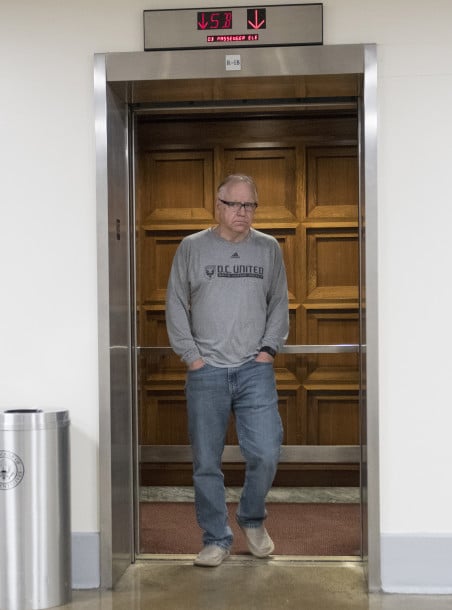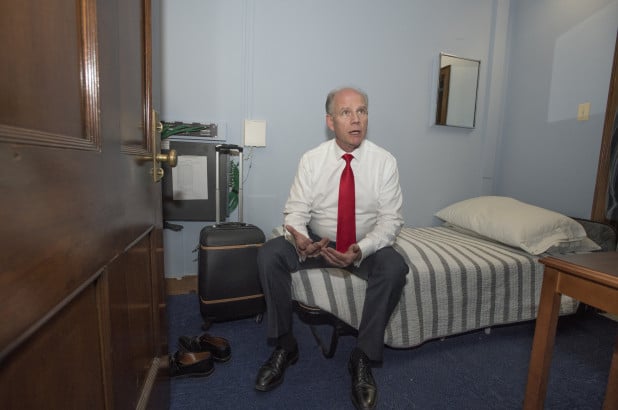If we go to the point where you have to rent or have a house in Washington DC, then only millionaires would be members of Congress. I don’t think that was the intent of our founding fathers.
Those were the words of Dan Donovan (pictured), a US congressman who passes the night in his office because he can’t afford accommodation in Washington DC. Donovan is not alone, many of his colleagues also do this because of the lack of resources.
Just two months ago, Shehu Sani, lawmaker representing Kaduna central senatorial district, disclosed that he and his colleagues receive N13.5 million monthly as running cost.
He said the running cost was in addition to over N700,000 monthly consolidated salary and allowances.
Advertisement

Kristi Noem, Lynn Jenkins and Jaime Herrera Beutler are all female lawmakers but they are known to sleep in their offices. Decrying poverty amid decade-long stagnant salaries and Washington’s steep cost of living, an increasing number of lawmakers have turned into professional squatters at night.
Meanwhile in Nigeria, the lawmakers not only sleep in choice properties in Abuja, some of them have mansions across the world.
According to a report by New York Post, out of the 435 representatives in the US, an estimate of around 100 members, including Paul Ryan, house speaker and Kevin McCarthy, majority leader, have turned into professional squatters at night in their offices while they shower at the congress gym.
Advertisement
Many of them previously got extra compensation, or a per diem, when they served in their home-state legislatures to cover their living expenses while at the state capitol. New York state lawmakers in Albany, for example, get $175 for each day they are in town. In other large cities such as Sacramento, California, the daily stipend rises to $183, and in Austin, Texas, it is $190.
But as members of the house, US reps receive a salary of $174,000 (N60.9 million) a year — a figure that hasn’t increased in nearly a decade — and no housing allowance, while working in a city where a sparse one-bedroom pad can start at $2,000 a month. Meanwhile, they also have to pay to maintain a residence in their home state.
“Members of the house and senate leadership seem to fare better, if only because they rake in nearly $20,000 more a year, or $193,400. There are few if any known examples of senators bunking down in their offices overnight,” New York Post said in its report.

Tim Walz, a member of the house of reps said, “I’m not complaining. It’s just figuring how to make all your finances work.”
Advertisement
Lee Zeldin said sleeping on a bed he stores in his office closet makes him more efficient but Adriano Espaillat said couch-crashing isn’t for him, even though he, too, faces a high cost of living back home in New York City.
“My couch is too hard. I’d wake up with a stiff neck every morning. I’m probably one of the poorest members of Congress,” Espaillat said.
The lawmaker from Buffalo said he used to split the rent for a basement apartment, paying $1,200 a month, but resorted to sleeping on a couch in his office when the college bills for his two kids began piling up.

Some lawmakers who can afford apartments in DC are looking into a bill to prohibit politicians from turning their offices into makeshift sleeping quarters. In his reaction to the proposed ban, Austin Scott, a member of the house said, “I think it’s ridiculous. I can’t afford an apartment.”
Advertisement
However, the cost of a sparse one-bedroom pad starts at $2,000 (N700,000) a month.
The Nigerian senator takes home N14.2 million monthly, the addition of the monthly running cost, consolidated salary and allowances. With N170.4 million annual income, they cruise in posh cars and sleep in palatial homes. The N200 million constituency fund each lawmaker is entitled to is a story for another day.
Advertisement
1 comments








Thank you for this expose, you have done your part as a credible media organization. it is now up to Nigerians to process the information, make informed judgement and decide the direction they would like to steer their contry